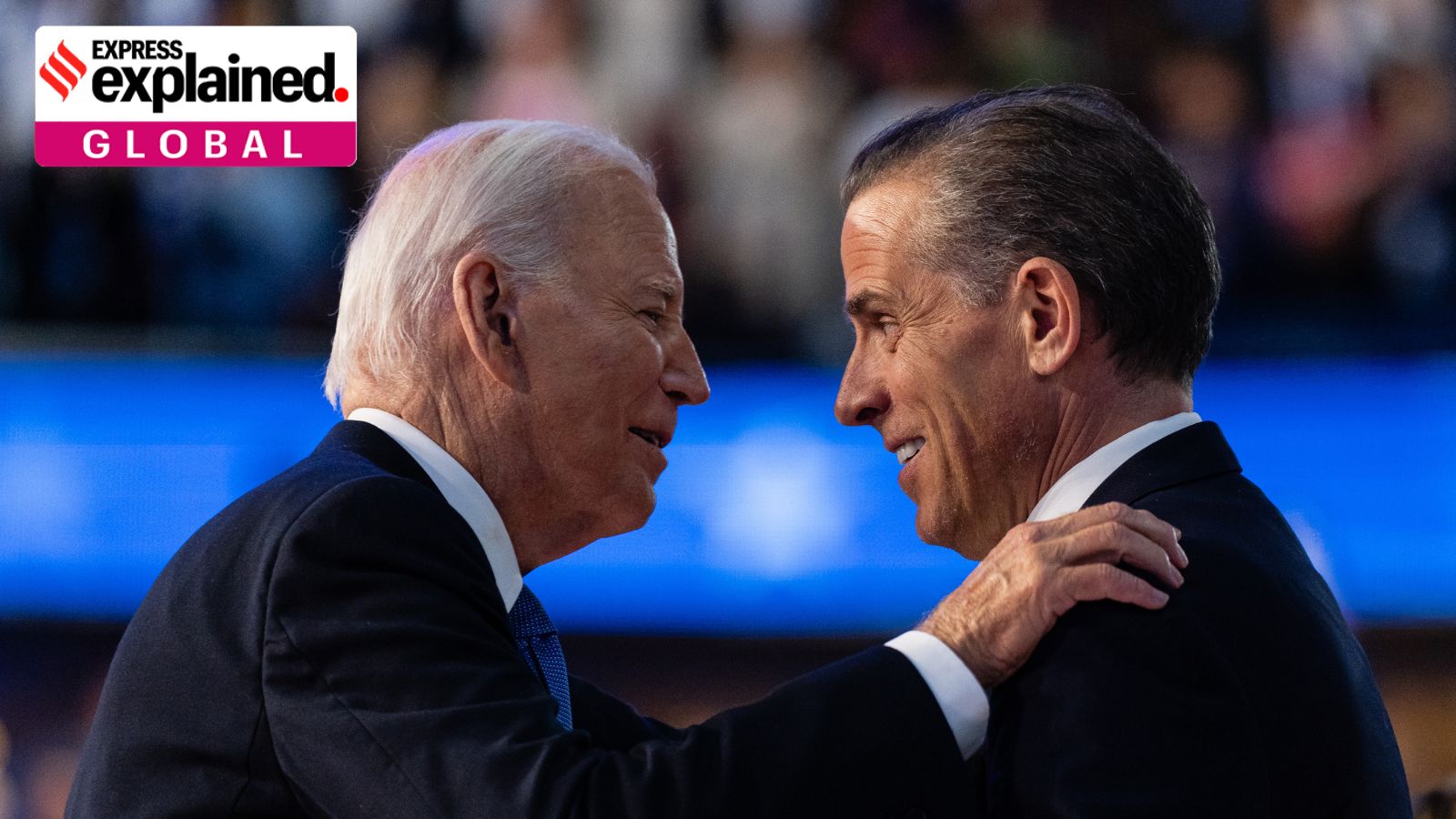US President Joe Biden issues pardon for son: what were the cases against Hunter Biden?
President Biden on Sunday evening issued a "full and unconditional pardon" on the federal cases against his son, Hunter Biden. Why did he backtrack on an earlier promise of not using the power to pardon in the case?
 President Joe Biden embraces his son Hunter Biden after his speech on the first night of the Democratic National Convention in Chicago, Aug. 19, 2024. (Via The New York Times/Eric Lee)
President Joe Biden embraces his son Hunter Biden after his speech on the first night of the Democratic National Convention in Chicago, Aug. 19, 2024. (Via The New York Times/Eric Lee)US President Joe Biden, on Sunday (December 1) evening, issued a sweeping pardon for his son Hunter Biden, backtracking on his earlier stance to not interfere in the sentencing against the latter. Hunter Biden stood to face sentencing this month for federal tax and gun convictions.
In an official statement from the White House, President Joe Biden acknowledged his earlier stance while describing his son as being “selectively, and unfairly, prosecuted” while being “treated differently”.
He wrote, “For my entire career I have followed a simple principle: just tell the American people the truth. They’ll be fair-minded. Here’s the truth: I believe in the justice system, but as I have wrestled with this, I also believe raw politics has infected this process and it led to a miscarriage of justice – and once I made this decision this weekend, there was no sense in delaying it further. I hope Americans will understand why a father and a President would come to this decision.”
By granting Hunter clemency, Joe Biden has ensured that President-elect Donald Trump cannot reverse this official grant upon assuming office.
What were the cases against Hunter Biden?
Hunter Biden awaited sentencing in two federal cases – one regarding his gun ownership and another alleging tax evasion.
He was criminally convicted by a jury in June of illegally buying and possessing a gun under the influence of crack cocaine. According to US federal law, users of illegal drugs cannot own firearms. The junior Biden, who has long battled drug addiction, was accused of lying about his drug use on a federal form he had filled out for a background check on his purchase.
“When the defendant filled out that form, he knew he was a drug addict… The law does not require us to prove that he was using drugs on that very day. Just that he knew he was a drug user,” prosecutor Derek Hines said during the trial. At the time, Joe Biden had ruled out the possibility of a pardon or commutation against his son, saying he respected the jury’s decision.
In September, Hunter pleaded guilty to nine tax offences in a California court, and was accused of failing to pay at least $1.4 million in taxes between 2016 and 2019.
He faced up to 25 years in prison in the first case, and 17 in the tax case, although The New York Times‘ report said he would be likely to serve both sentences concurrently. Hunter Biden said he has been sober for the last five years.
What is a presidential pardon?
According to the US Constitution, a president has the broad “power to grant reprieves and pardons for offences against the United States, except in cases of impeachment”.
In Hunter Biden’s case, the pardon means legal forgiveness for his crimes and eliminates the possibility of jail time. Thus, the judges overseeing his cases will likely cancel the sentencing hearings, which were slated for December 12 in the gun case and December 16 in the tax case.
The “full and unconditional pardon” by President Biden accounts for all potential federal crimes Hunter may have committed between January 2014 and December 2024. However, the President can only issue pardons for federal crimes, and not for state crimes.
How has Donald Trump reacted to this news?
In a post on social media website Truth Social on Sunday night, President-elect Donald Trump called the pardon “such an abuse and miscarriage of Justice!”
However, Biden is not alone in pardoning a close relative. In 2020, Trump pardoned Charles Kushner, the father-in-law of his daughter Ivanka. Kushner was charged with tax evasion, campaign finance offences and witness tampering in 2004 and was sentenced to two years in prison.
Trump has also promised to grant pardons to his supporters who stormed the US Capitol on January 6, 2021, whom he described as the “J-6 hostages”, once he returns to office.
- 01
- 02
- 03
- 04
- 05






































